Library
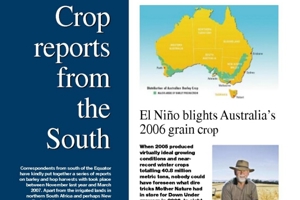 IBD Membership Required
IBD Membership Required
Crop reports from the South
By: Various Authors
01/06/2007
Correspondents from south of the Equator have kindly put together a series of reports on barley and hop harvests with took place between November last year and March 2007. Apart from the irrigated lands in northern South Africa and perhaps New Zealand, the constant thread running through is the lack of rainfall and we have an explanation of El Niño and the more benign La Niña which affect the climate around the southern oceans. Very little spare raw materials have been added to the world’s supplies and we now look to Europe and North America for a good harvest but will a dry warm April and a very wet mid May be able to deliver?
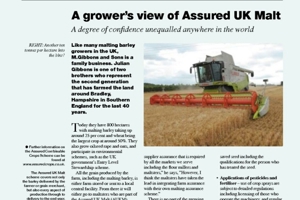 IBD Membership Required
IBD Membership Required
A grower’s view of Assured UK Malt
By: Roger Putman
01/06/2007
Like many malting barley growers in the UK, M.Gibbons and Sons is a family business. Julian Gibbons is one of two brothers who represent the second generation that has farmed the land around Bradley, Hampshire in Southern England for the last 40 years.
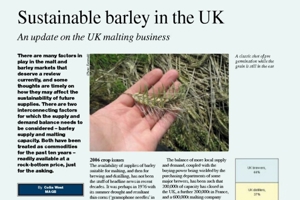 IBD Membership Required
IBD Membership Required
Sustainable barley in the UK
By: Colin West
01/06/2007
There are many factors in play in the malt and barley markets that deserve a review currently, and some thoughts are timely on how they may affect the sustainability of future supplies. There are two interconnecting factors for which the supply and demand balance needs to be considered – barley supply and malting capacity. Both have been treated as commodities for the past ten years – readily available at a rock-bottom price, just for the asking.
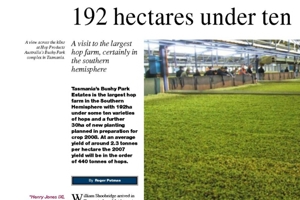 IBD Membership Required
IBD Membership Required
192 hectares under varieties of hop
By: Roger Putman
01/06/2007
Tasmania’s Bushy Park Estates is the largest hop farm in the Southern Hemisphere with 192ha under some ten varieties of hops and a further 30ha of new planting planned in preparation for crop 2008. At an average yield of around 2.3 tonnes per hectare the 2007 yield will be in the order of 440 tonnes of hops.
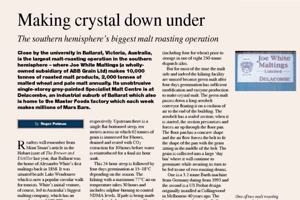 IBD Membership Required
IBD Membership Required
Making crystal down under
By: Roger Putman
01/06/2007
Close by the university in Ballarat, Victoria, Australia, is the largest malt-roasting operation in the southern hemisphere – where Joe White Maltings (a whollyowned subsidiary of ABB Grain Ltd) makes 10,000 tonnes of roasted malt products, 2,000 tonnes of malted wheat and pale malt annually. Its unobtrusive single-storey grey-painted Specialist Malt Centre is at Delacombe, an industrial suburb of Ballarat which also is home to the Master Foods factory which each week makes millions of Mars Bars.
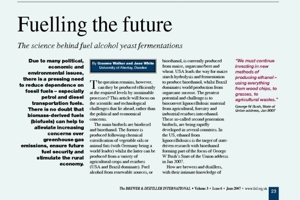 IBD Membership Required
IBD Membership Required
Fuelling the future
01/06/2007
Due to many political, economic and environmental issues, there is a pressing need to reduce dependence on fossil fuels – especially petrol and diesel transportation fuels. There is no doubt that biomass-derived fuels (biofuels) can help to alleviate increasing concerns over greenhouse gas emissions, ensure future fuel security and stimulate the rural economy.
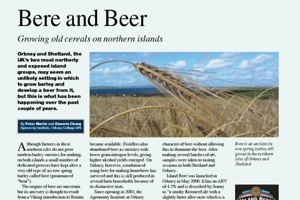 IBD Membership Required
IBD Membership Required
Bere and Beer
By: Peter Martin, Xianmin Chang
01/06/2007
Orkney and Shetland, the UK’s two most northerly and exposed island groups, may seem an unlikely setting in which to grow barley and develop a beer from it, but this is what has been happening over the past couple of years.
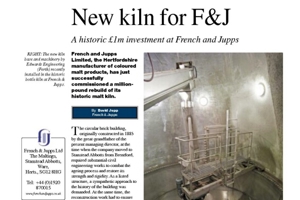 IBD Membership Required
IBD Membership Required
New kiln for French and Jupp
By: David Jupp
01/06/2007
French and Jupps Limited, the Hertfordshire manufacturer of coloured malt products, has just successfully commissioned a millionpound rebuild of its historic malt kiln.
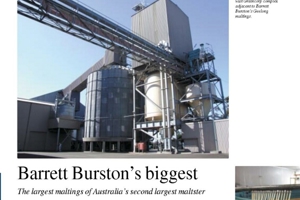 IBD Membership Required
IBD Membership Required
Barrett Burston’s biggest
By: Roger Putman
01/06/2007
Barrett Burston is Australia’s second largest malting concern. Now part of the recently established United Malt Holdings (which also owns North American maltsters Canada Malting Company , Great Western Malting Company and Bairds in the UK) it can trace its origins back to immigrants during the gold rush years of the 1850s.
 IBD Membership Required
IBD Membership Required
What did the EBC do for you?
By: Roger Putman
01/06/2007
The European Brewing Congress descended on Venice for the 31st Convention last month. As well as sharing knowledge, having a chance to ponder without the phone ringing or a meeting to attend, we do hope that delegates had a chance to explore the historic city which lay a 15 minute water-bus ride away across the lagoon.
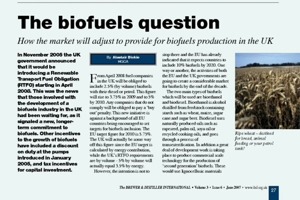 IBD Membership Required
IBD Membership Required
The biofuels question
By: Alastair Dickie
01/06/2007
In November 2005 the UK government announced that it would be introducing a Renewable Transport Fuel Obligation (RTFO) starting in April 2008. This was the news that those involved with the development of a biofuels industry in the UK had been waiting for, as it signaled a new, longerterm commitment to biofuels. Other incentives to the growth of biofuels have included a discount on duty at the pumps introduced in January 2005, and tax incentives for capital investment.
Some of the content requires an active membership to view.
You can find out more here
Some of the content requires an active membership to view.
You can find out more here
